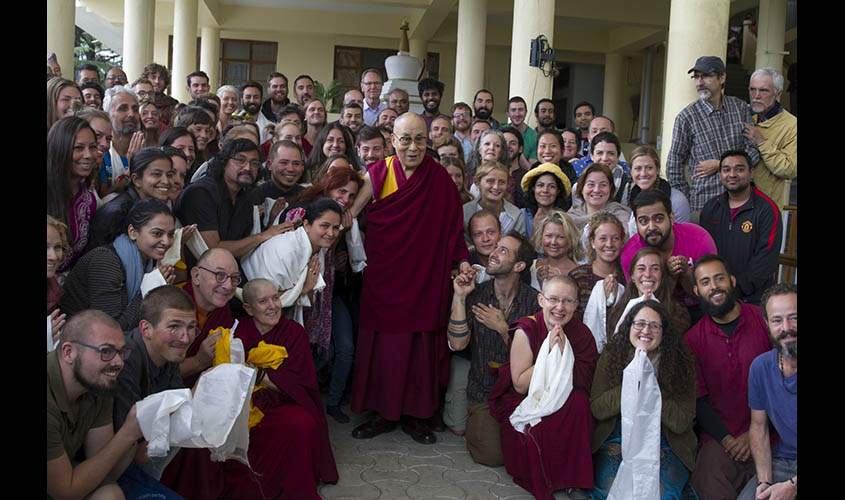India is home to the Dalai Lama and an estimated 120,000 Tibetan refugees. Though this humanitarian gesture on India’s part comes at the cost of risking New Delhi’s relations with China, India has never wavered in ensuring that Tibetans live with dignity and respect. Notified settlements across the country were made available so that they can live as independently as possible and practice Tibetan religion and culture. They are also allowed to establish centres of higher learning in Tibetan Buddhism. As a result, several reputed Buddhist institutes came up in Karnataka, and in the Indian Himalayan belt. In what may be termed as a gesture well reciprocated, and because of the respect and influence His Holiness the Dalai Lama commands, the Tibetan diaspora also lived as a peaceful community, rarely creating problems for India’s law enforcement agencies.
The situation, however, changed from 2000 onwards when unityamongst Tibetans suffered some setback due to developments like the Karmapa succession controversy and the controversy over worshiping of Dorje Shugden. In a unique case of politics getting the better of religion, two senior monks of the Karma kargyue sect of Tibetan Buddhism, Tai Situ Rinpoche and late Shamar Rinpoche, developed serious differences after the demise of Rangjung Rigpe Dorje, the 16th Karmapa, in 1981. This animosity ultimately led to emergence of two 17th Karmapa candidates in the early nineties. While Tai Situ Rinpoche identified and recognised UghyanThinley Dorje, late Shamar Rinpoche anointed Thinley Thaye Dorje as his Karmapa candidate. Enthronement of their respective protégés at the Rumtek Monastery in Sikkim, the supreme seat of the Karma Kargue linage, being their primary objective, both started indulging in activities monks normally are expected to, and bitterness spewed against each other.
The bitter rivalry assumed a new dimension when UghyenThinley Dorje suddenly appeared in India in January 2000. The competition became fiercer and hectic political lobbying, never known in the history of Tibetan Buddhism on Indian soil, became common place. Apart from pulling strings at their disposal in Sikkim as well as in the power corridors of New Delhi, these senior monks spat against each other with allegations and counter allegations, widening the gaps between their supporters. His Holiness the Dalai Lama, choosing to favour one of the candidates—a decision many Tibet watchers felt was ill-timed—had also limited possible scope of rapprochement. Hence, the Karma Kargyue followers are now vertically divided, while the camps are dragged into a long drawn legal battle.
Another development that unfortunately split the Tibetans is the controversy over Shugden worshipping, which again is an internal matter of the Gelugpa sect, to which the Dalai Lama belongs. It erupted as a result of the Dalai Lama urging Tibetans to refrain from worshiping Dorje Shugden, a deity believed to be a protector, according to Tibetan legend. Shugden practitioners, who felt offended by the call, describe it as an attack on freedom of religion, a right, which Dalai Lama himself tirelessly fought for. On the other hand, die hard Dalai Lama followers perceived the questioning of the decision as one challenging the wisdom of the Dalai Lama and mounted massive pressure on Dorje Shugden practitioners to relent, with some even demolishing the statues of the deity. The rivalry ultimately led to split in two Gelug monasteries in Karnataka, and Serpom and Shar Garden monasteries in Bylakupe and Mundgod respectively came under the control of Shugden followers. The bitterness associated with the split is exemplified by the fact that till today, members of these monasteries are treated as some sort of outcasts by the others. Thus, for the first time, the Tibetan diaspora in India gave birth to sections opposed to the Dalai Lama, with spillover effects in Tibet and elsewhere.
For India, with a fragile internal security profile, a divided Tibetan population on its soil is not good news. It has several long-term implications. It is common knowledge that China considers Dalai Lama as a secessionist, one plotting to divide their country. The latter’s claim of “all that Tibetans were asking for, was a status of genuine autonomy within the Constitution of the Peoples’ Republic of China”, had fallen into deaf ears. China also considers him as someone who plays to the Indian tune to tickle China. Therefore, at a time when China has successfully shrunk the Dalai Lama’s space internationally, India continuing to extend the usual space for him is viewed as complicity. Sharp reaction from China when he was allowed to visit Arunachal Pradesh in April 2017, is a recent example. Such being the delicate nature of India-China relations on matters and issues concerning Tibetans, India can hardly afford to ignore the division within the diaspora. Past experience of dubious elements from Tibet having succeeded in infiltrating the Central Tibetan Administration, including the security wing, should be a warning.
It is also time India understands the reason behind Tibetans seeking Indian passports, despite an existing arrangement for issue of Identity Certificates, which is passport equivalent. Some had even successfully taken recourse to legal remedy on the issue, and left the government of India red-faced. These changing moods should not be viewed as desires by Tibetans to become Indian citizens. They are triggered by the pathetic state of affairs associated with issuing of Identity Certificates, where delays in most cases are anything between six months to one year. Early streamlining of the process will drastically reduce their desire to hold Indian passport. It will also remove the wrongly perceived notion among some educated Tibetan youth, that the cumbersome process was a ploy by India to confine them in this country. While India should not shy from requesting the Dalai Lama to use his good offices to end all differences within the community in the interest of India’s internal security, it will also be necessary to ensure that young Tibetans do not nurse a silent grudge against the very country they called their second home.

